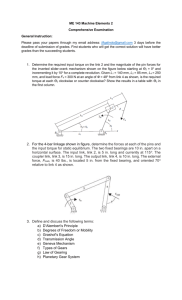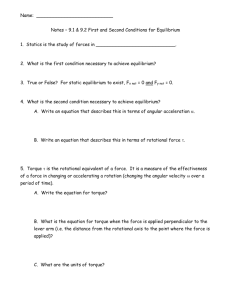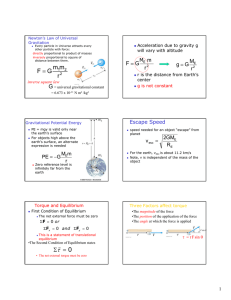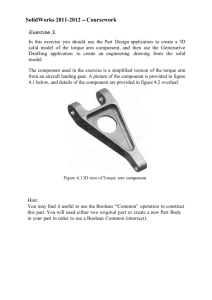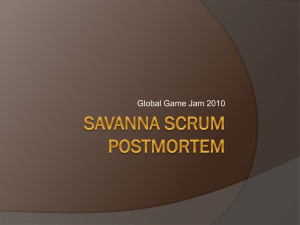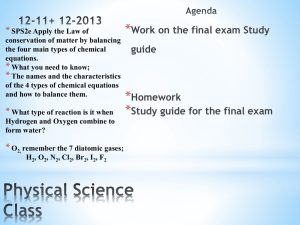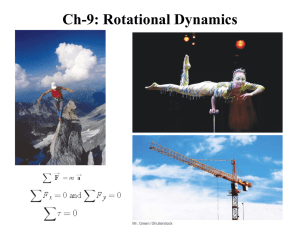Chapter 8 Statics
advertisement
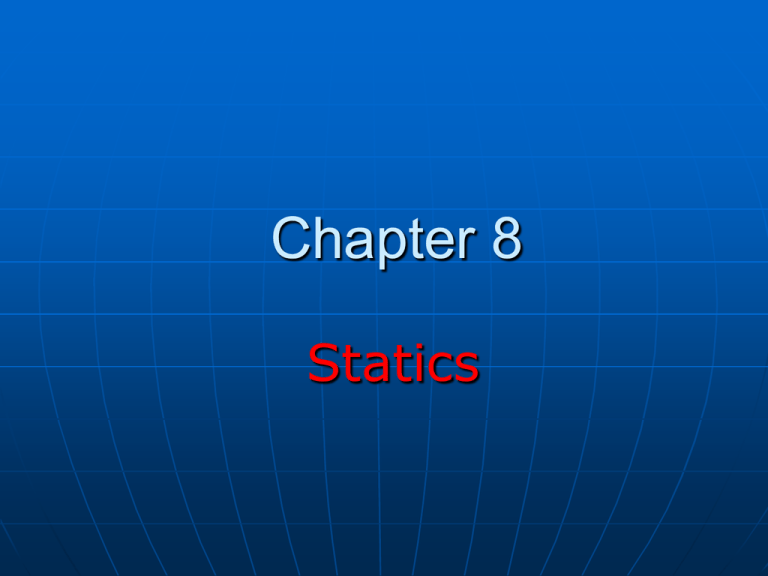
Chapter 8 Statics Equilibrium An object either at rest or moving with a constant velocity is said to be in equilibrium The net force acting on the object is zero (since the acceleration is zero) F 0 1st Condition for Equilibrium Net force vanishes F F F 1 F F 2 F3 ... 0 x F1x F2 x F3 x ... 0 y F1 y F2 y F3 y ... 0 Method Isolate object of interest Draw picture, label all forces Choose appropriate coordinate system Resolve into components Write equations for equilibrium Solve equations for unknowns Example Mass m on table top 200 lb man hanging from rope Example (ex 2) Find tensions in the ropes. Example 8.4 Two objects are in equilibrium. Find the weight of the one on the left and tensions. Force vs. Torque Forces cause accelerations Torques cause angular accelerations • rotation Force and torque are related Torque The door is free to rotate about an axis through O There are three factors that determine the effectiveness of the force in opening the door: • The magnitude of the force • The position of the application of the force • The angle at which the force is applied Torque, cont Torque, t, is the tendency of a force to rotate an object about some axis t Fl t is the torque F is the force • symbol is the Greek tau l is the lever arm SI unit is N.m Lever Arm: Perpendicular distance from the pivot point to the line of force Direction of Torque Torque is a vector quantity • We will treat only 2-d torque so no need for vector notion. • If the turning tendency of the force is counterclockwise, the torque will be positive (+) • If the turning tendency is clockwise, the torque will be negative (-) Multiple Torques When two or more torques are acting on an object, the torques are added • with the signs If the net torque is zero, the object’s rate of rotation doesn’t change General Definition of Torque The applied force is not always perpendicular to the position vector The component of the force perpendicular to the object will cause it to rotate t FL sin l L sin F is the force L is distance between pivot and point of action is the angle Example (8.20) Torque problem F1 F2 F3 F4 60 N L 2m Center of Gravity The weight of an object can cause object to pivot C.G. used as pivot will have no torque due to gravity In finding the torque produced by the force of gravity, all of the weight of the object can be considered to be concentrated at a single point, C.G. Center of Gravity of a Uniform Object The center of gravity of a homogenous, symmetric body must lie on the axis of symmetry. Often, the center of gravity of such an object is the geometric center of the object. Experimentally Determining the Center of Gravity The wrench is hung freely from two different pivots The intersection of the lines indicates the center of gravity A rigid object can be balanced by a single force equal in magnitude to its weight as long as the force is acting upward through the object’s center of gravity 2nd Condition for Equilibrium No rotation Net torque vanishes t t 1 t 2 t 3 ... 0 Example 1000 N sign painter on an uniform 250N board suspended by two ropes. The board is 5m long. If the rope can hold only 900 N, is it safe for him to stand 1m from a rope? Example 600 N worker standing 1.5 m from the wall on 5m long and 300N beam as show. Find tension in the cable and the force on the beam by the wall.
